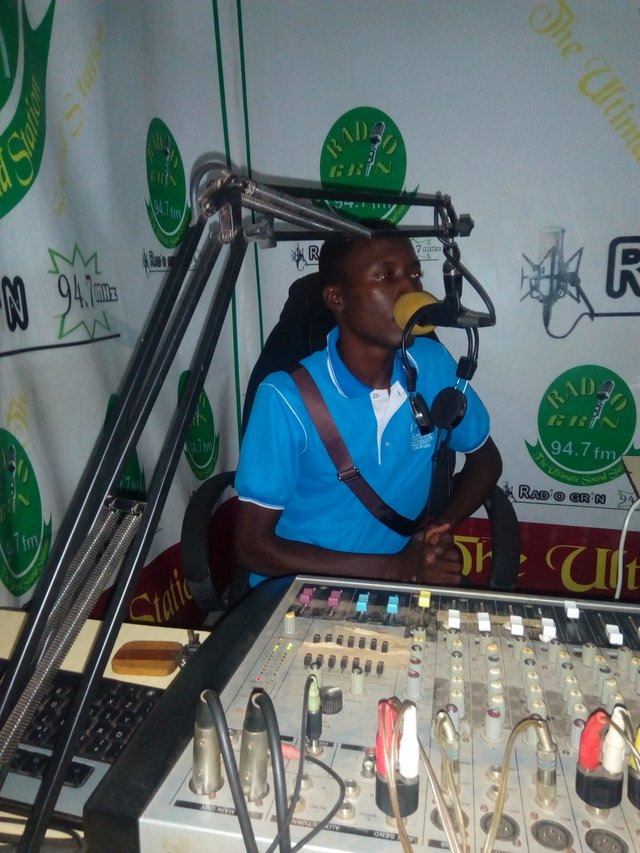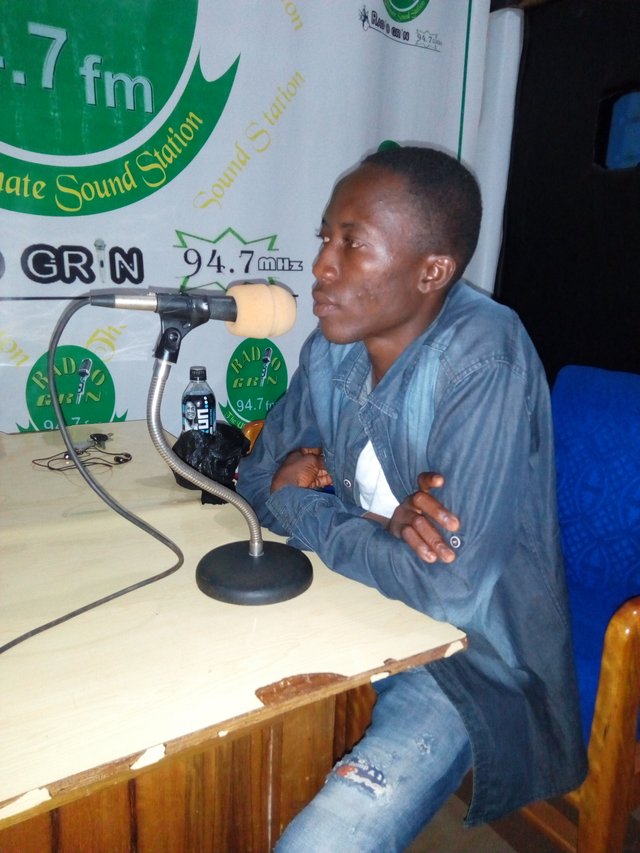THE ROLE OF THE MEDIA IN GHANA'S DEMOCRACY(POLITICAL COMMUNICATION) BY -SUMAILA MOHAMMED

Post-independent media interaction in the first republic saw the establishment of state institutions such as the Ghana News Agency, Ministry of Information and Broadcasting, Ghana Broadcasting Corporation etc. Soon after independence, most newspapers were nationalize and served as the mouthpiece of the government and sometimes propaganda tools. With the legislation of PDA and other laws, the media’s role as advocates of good governance and watchdogs of duty bearers was relegated to the latter.
Thus, political communication was not part of the daily topic in Ghana at that time.
In the military regimes, political communication was never discussed unless used by the regime as a conduit for propaganda and means of capturing power. The height of media monopoly by the state was experience under military regimes.
The Ghana media landscape was purely state led from the era of the first republic, through to military regime until the coming of the fourth republic constitution. In these era, the media which was traditional in nature was monopolized by the state and used as a tool for propaganda.
The traditional media which consist of Radio, Television and Newspaper was used not to debate and critique initiatives by the military regimes, rather it was used to justify heinous act perpetrated by the regime on its opponent. Political propaganda and justification of unpopular actions became rampant in the media under these regimes. Mega looting of state coffers were never discussed neither did political topics that would help return the country to democratic rule discussed either. This period is sometimes referred to as the culture of silence (1982-1992).
The coming into force the forth republic (1992 republican constitution) and the establishment of media commission helped liberalized the media landscape. The early days of the forth republic saw the establishment of private media house where political issues were discussed.
The change of government from NDC to NPP in 2000 also helped liberalize the airwaves because of the repeal of criminal libel law. This saw the spawning of many media house that was very critical of government. This era also saw the birth of the new media that serves as a platform in discussing political topics that reach large anonymous audience. The Ghanaian media landscape has evolved from state monopoly and propaganda, to robust privately led media. This has help in keeping politicians accountable and giving journalistic mic to the subaltern to express their willpower on political issues.
The current Ghanaian media both traditional and new media are dominated by the private sector which is owned by private individuals and politicians. Political topics are regularly discussed on talk shows in the morning, afternoon and evening with opportunity to phone into a live talk show and express yourself. This phone-in session has now become part of Ghana’s political communication and those involved are labeled as “serial callers”. This has helped consolidate Ghana’s democracy and deepen Ghanaians understanding of politics. In deed this success can be linked to the strict adherence of the dictates of the constitution and the fact that all political communication actors (politicians,media,civil societies,citizenry) believes that, their success can only thrive on the practice of constitutionalism.

Ghana’s political actors consist of the media, politicians, civil society and citizenry. These actors have work hand in hand to consolidate Ghana’s democratic gains thus, creating a space for political communication to thrive. Political actors of communication has become part of Ghana’s democratic gains in the sense that such practice goes hand-in-hand with democracy. Political communication has become a profession in Ghana with various kinds of offshoots from this profession. Politicians as the main actors of political communication, always uses the media and sometimes civil societies as a conduit to achieve their aim.
Civil societies has become a very key actors on political communication issues in Ghana, by influencing government policies at any level. Through the media, civil societies have become vocal and a powerful force to recon with when it comes to how voters understand policies. Civil societies have also act as watchdog of corruption and other salient issues in Ghana and thus, has become a gateway through which politicians sometimes use to communicate political messages to voters. Even though citizens as actors of political communication are always at the receiving end, it is worthy to note that, citizens are not passive consumers of political messages only but has become active contributors to political messages.
Citizens have evolve from just receiving political information to giving political information through the media. This shows that almost all the actors of political communication depends on one another and thus, the role as an actor cannot be played solely by one actor effectively. Citizens can now differentiate between fake political promises and genuine political promise this is as a results of how savvy citizens has become when it comes to the consumption of political information.

source
The media is one of the key indispensable actors when it comes to discourse on political issues in Ghana. It has succeeded as actors of political communication due to multiplicity of the scope of media landscape. The Ghanaian media landscape is neither monopolize by the state nor by conglomerates. This has allowed them to serve as door way for citizens to critique politicians on political matters and deepen citizens understanding on political matters. The media has successfully played the role as actors through the following means and efforts;
The media effect on public opinion and voting the traditional media through the media effect has been able to shape the thought of the Ghanaian audience, the media has skillfully done this through agenda setting theory by choosing which story is newsworthy or which story deserves public attention. The media effect manifest itself through priming, framing, value-laden language, anecdotes and persuasion on salient political issues in Ghana. This practice has the power to shape the thoughts of the public and how they react to political issues. This usually happens on talk shows, newspaper reviews editorials and news stories. This has help explain complex policies to the ordinary citizens and sometime this leads to public backlash and subsequent withdrawal of such policies.
Entertainization of Political Information and Satire the media in Ghana has used entertainment platforms to spread political information in a subtle manner. The use of political slogans, jingles and songs are played on drive time programs as means of entertaining listeners. Political actors are ridicule in a satirical way. This has helped increase political topics in the media even on the entertainment showbiz. In the press and new media, cartoons and political caricature are publish to make fun of politicians. An example is tilapia cartoon, back page etc.
Adversarial journalism This role has become more popular in Ghana where journalist compare past and present videos, audios and images to remind politicians of their grandiose promise while mocking them of their failure to deliver their promise. This is often seen through interviews where journalists adopt stance of opposition and ask cogent questions to expose politicians. The media in Ghana is credited as serving as watchdogs and being critical of politicians.
Coverage of political events-this is when the media report, transmit and broadcast live event of political rallies to its audience. This role played by the media has help bring political information close to the people. Events such as press conference has helped journalist question audience would want to find answers to.
In-fact Ghana’s democratic consolidation has been partly attributed to the media through their coverage of election and report on fraud and violence in the country. The media has helped broadens understanding on electoral activities especially the do’s and don’ts in an election. In-fact most media houses set-up parallel coalition centers to provisionally come up with results.

Source
CONCLUSIONS AND LESSONS LEARNT.
In conclusion, the history of political communication in Ghana dates back as long as the colonial ages where it was used as a conduit to expand British imperial rule. This era followed by the post war era, where the nationalists used the media to awakened the people to fight for independence. Newly independent Ghana practiced some form of censorship and later on nationalize all the press under Nkrumah. The era was followed by the military regimes where the media was used as an instrument of capturing power and championing state propaganda. This checkered history of media freedom came to an end after the promulgation of the fourth republican constitution that guaranteed press freedom and independence.
The subsequent repeal of the criminal libel law by the Kuffour’s administration cemented the freedom enjoyed by the press and saw the spawning of many media outlets that are privately led. The Ghanaian media landscape is dominated by private ownership without any conglomerates.
The political culture of Ghanaians are highly influenced by the media and its effect. Ghana’s democratic consolidation is partly as a results of how the media has explain complex policies to the ordinary citizenry. The advent of new media has helped critique political actors due to its wider audience and anonymity.
One important lesson learnt from political communication in Ghana is the power and role of the media in getting docile citizens to rise up to demand independence from the erstwhile colonial power. The media has serve as a platform for political mobilization especially in the advent of new media.
Another key lessons is the indispensable role the media plays in broaden our understanding on democracy by informing us and giving us the power (mic) to express ourselves.
Again, political communication in Ghana has helped increase quality policies and competition among political actors. This has helped politicians come up with solutions to problems suffocating the ordinary Ghanaian. The usual critique from the media and critical journalist has force political actors up their game and listen to the voters
Thanks for reading!!!!
You have a very long content, well done.
Thanks for reading!!